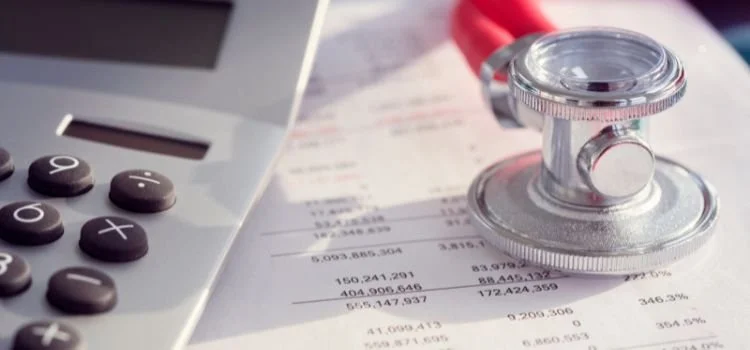How to Conduct a Financial Health Check for Your Resale Business
It’s easy to assume your business is fine just because sales are coming in. But that doesn’t always mean your finances are healthy.
Sometimes, trouble builds quietly from missing records, overpriced stock, margins that don’t cover costs and by the time it shows up clearly, it’s harder (and more expensive) to fix.
That’s why a regular financial health check is essential.
Think of it as a quick audit for yourself: no HMRC letters, no pressure, just a way to spot weaknesses early and stay in control.
Let me show you how to go about that.
How to Run a Financial Health Check
Review your sales performance and profit margins
Start with the numbers that actually keep your business alive: your sales and margins. It’s easy to focus on turnover (“We made £10k this month!”), But that number doesn’t mean much if your costs are eating most of it.
What you’re really looking for is gross profit, which is the amount left after you subtract the cost of the goods sold (COGS). For resellers, especially under the VAT Margin Scheme, this should be checked regularly.
Here’s how to do it:
Pick a recent period (last month or quarter)
Total up your sales
Subtract what you paid for the items you sold
What’s left is your gross profit
Divide that by your total sales to get your gross profit margin (e.g. £3,000 profit on £10,000 sales = 30%)
A healthy resale business usually sees margins of 20–50%, depending on the industry.
If your margin is shrinking over time, it might be a sign that:
You’re overpaying for stock
Undervaluing your selling prices
Not accounting for hidden costs (repairs, packaging, delivery, etc.)
A simple bookkeeping tool like QuickBooks works. The key is consistency. If you don’t track your margins, you can’t fix them.
Check that your financial records are accurate and up to date
Even if your sales look good on paper, messy records can quietly derail everything. If invoices are missing, receipts are unfiled, or you can’t trace where certain stock came from, it can be risky.
This part of your financial health check is about making sure your paper trail matches your reality.
You should check your;
Sales invoices: Do you have clear, dated records for each sale?
Purchase records: Can you link each item sold to a recorded purchase (especially if you’re using the VAT Margin Scheme)?
Bank transactions: Do they align with your books? Are all business expenses accounted for?
Cash payments: Are they recorded properly, with supporting paperwork?
Small inconsistencies like a cash sale with no invoice, can raise red flags during an audit or throw off your VAT return.
To clean it up, start small. Pick a month and go through it line by line. Check that everything is logged and linked. Then work forward, and keep it consistent going forward.
HMRC’s guidelines on record keeping for VAT Margin Scheme businesses are a good reference if you’re unsure what’s required.
But seriously, if you find yourself constantly fixing errors or chasing missing documents, it may be time to streamline your system or get help from a professional.
Assess your VAT records and Margin Scheme compliance
If your resale business uses the VAT Margin Scheme, your VAT records are the backbone of your reporting. And unlike standard VAT accounting, mistakes here are easier to make and harder to fix.
This checkpoint is about confirming that your VAT position is accurate, justified, and backed by the right paperwork.
Are your margin calculations correct?
Each eligible item should show:
Sale price – Purchase price = Margin
VAT is then calculated on the margin only, not the full sale price.Are your invoices compliant?
Margin Scheme sales must have invoices that clearly state:
“Margin Scheme – second-hand goods”
You must not show VAT separately on these.Do your records link purchases and sales?
Each sale should be traceable back to a purchase, with matching item details and reference numbers.Have you mixed ineligible items with Margin Scheme sales?
Goods bought with full VAT or for personal use can’t go under the Margin Scheme. These must be treated differently.
You can check our guide on Penalties for Non-Compliance with the VAT Margin Scheme to understand the risks and how to avoid them.
Tip: If you’re unsure about any part of your VAT setup, it’s worth having it reviewed by an accountant who understands the scheme.
Analyse your cash flow and prepare for slow months
It’s easy to feel like things are going well when money is moving. You’ve made a few solid sales, your bank balance looks healthy, and stock is flying out the door. But then it happens a quiet stretch. Fewer customers. A deal falls through. Repairs on new stock cost more than expected.
Suddenly, cash is tight, and you’re scrambling to fill the gap.
That’s why cash flow is the final, and arguably most telling part of your financial health check.
You should be asking:
- Can my business survive a slow month?
- Do I have money set aside for tax, stock, or surprises?
- Am I spending based on today’s sales or last month’s numbers?
If the answer to any of those is “not really,” don’t panic. A lot of resale businesses run lean without realising how vulnerable they are until something stalls.
Look at the last 3 months of your bank activity
Separate fixed costs (rent, salaries, subscriptions) from flexible ones (stock, repairs)
Check your average monthly inflow vs outflow
Identify which weeks or months tend to be quieter
If you notice dips or that your “buffer” is just overdraft, it’s time to build some breathing room, whether that’s reducing non-essential spend, staggering payments, or putting aside a little from each sale.
It’s not about perfection. It’s about giving your business a bit of space to breathe, especially in an industry that doesn’t always run on a predictable schedule.
Analyse cash flow and prepare
Conclusion
A financial health check doesn’t need to be complicated. It’s about pausing to ask: Are we profitable? Are our records solid? Is our VAT right? Can we weather a quiet patch?
By working through these four areas, even just once a quarter, you’ll catch small issues before they become costly ones, and you’ll feel more in control of your business.
At Rhombus Accounting Firm, we help second-hand businesses across the UK make sense of their numbers and stay confident in their finances, whether they’re just starting out or scaling up. If you’d like that for your business, feel free to reach out.
Thanks for reading!
Meet Lewis
Lewis is a professional accountant and the founder of Rhombus Accounting. He regularly shares his knowledge and best advice on his blog and other channels, such as LinkedIn.
Book a call today to learn more about what Lewis and Rhombus Accounting can do for you.




